Making A Garden Grow: The sponsor/athlete seed

In 2007 when I first started running competitive ultras with fair success, it was a pretty laid back, low key sport. Western States seemed to be the only major 100 miler in the world. Most any other race, you could sign up for on the day of. Most fast "elite" runners only raced regionally. Traveling out of state was a fairly big deal. Traveling out of the country was almost unheard of. In 8 years, ohhhh how the landscape has changed dramatically... and I like that. The growth of our sport is exciting! Yet like anything else, there will always be some growing pains. 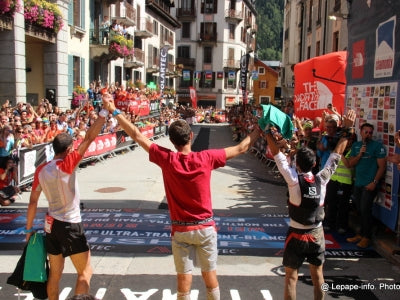 One particular thing I've noticed recently is a spat of sponsored elite athletes dropping, or not starting certain races. Surrounding this occurrence has been some intriguing discussion inferring that beyond the typical wear and tear dilemmas which usually lead to the unfortunate DNF (Did Not Finish) and DNS (Did Not Start), the position of runners not wanting to tarnish the athlete/sponsor relationship with poor performances may possibly be another driving force.
One particular thing I've noticed recently is a spat of sponsored elite athletes dropping, or not starting certain races. Surrounding this occurrence has been some intriguing discussion inferring that beyond the typical wear and tear dilemmas which usually lead to the unfortunate DNF (Did Not Finish) and DNS (Did Not Start), the position of runners not wanting to tarnish the athlete/sponsor relationship with poor performances may possibly be another driving force.
Now, before anyone gets their panties in a bunch, I want to be clear that I'm neither condoning nor condemning. Consider this more of an editorial, as I'm just exploring the subject. Instead of presenting hard facts collected with footnotes, time tables, or smarty pants charts, I'm simply sharing a perspective that I've mulled over before in the past because of my own experience, as well as from lively conversations with several others close to the subject. As both a past and self-sponsored athlete, and now (GASP!) a corporate sponsor myself, it's a slice of this new emerging pie that compels me to dig a little deeper into what this story might be all about.

The running billboard. In simpler days. Photo: Facchino Photography
Ultra168.com posted an interesting article: What's with the DNF? after this year's 2015 UTMB- (Ultra Trail du Mont-Blanc). In it, they wrote about the unusually high occurrence of DNF's and DNS's from the race in both the elite men's and women's field, as well as other largely competitive races throughout the year. Many of those DNF's could easily be the result of athletes pushing the personal "all or nothing" limit in unusually rough conditions, and burning to the ground in a blaze of glory. I was there, and saw how the unseasonably humid weather added an extra dimension of difficulty to the event. A few other possible reasons were described in the article, like "chasing ‘race perfection'", something most all of us do. However, I was struck by the final underlying perspective that, for the sake of a sponsor's hopes and expectations, many of these athletes may possibly be loading their calendar with events they know they may not have stellar performances at, yet still hope for the best by playing the odds of "having a good day". Unfortunately, if the going gets tough, they'll take the DNF or DNS (a non placement result) over a potentially lackluster finishing place that may glare on their permanent record far more than the non finish. Live to race another day... and hope that another day puts you somewhere at the top. I say that in earnest, due to being in that head space before, myself, and knowing others who have as well. For many it can be a numbers game. Instead of entering 2 or 3 key races during the year and training to do well at 1, 2, or all 3... You enter 9, for a chance that the odds increase. The only problem (as stated in the article) is that this can be a fantastic recipe for overtraining, injury, and/or burnout.
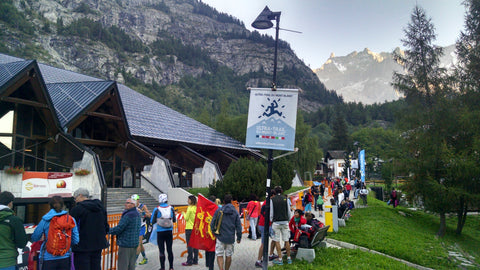
I have no issue with the numbers game. As long as you're working up to a realistic amount of "A" races, I think it's great to have a few "training -B" races. I think it's even better to not show up and race if you feel that putting yourself in race mode for a training run might lead to overtraining injury, and hurting the path to race "A". The only thing that truly concerns me about a possible trend in all this, is an unhealthy pressure that the athlete unnecessarily places on him or herself for the sake of pleasing a sponsor.

Mugging with a few athletes who knows how to care for longevity.
Even if you're not running for the podium, everyone has their benchmark. When we set goals for ourselves and don't meet them, usually no one else is disappointed in us except ourselves. When corporate sponsor "x" pays for your travel, lodging, race fees, and wardrobe to exotic locale "y", the pressure is understandably elevated. I hate to think that our growing international sport of trail and ultra has reached the point where, in certain cases, sponsorship support turns into pressure that alters the normal flow of an athlete's game choices. As the competitive field elevates even higher, what does that mean for the sport? It's not like we're making millions like pro ball players, but in many respects, some of what's being offered elite runners goes a long way, and in a competitive workspace, where longevity and relevance is key, there's always another athlete waiting in the wings to fill the void. Although the numbers are modest, Trail and Ultra has professional players (and those numbers will grow). Those players, understandably, want to play on the team as long as they can. Who can fault them? Unfortunately, if there's any substance to this theory, it'll mean that gifted athletes may be cutting their performance life unnecessarily short. So many have shot up like rockets to fantastically explode within a few years of making the scene. For many it's also not uncommon to see them spending up to a year on the injured list. When most contracts are written on a year to year basis, the time span to prove your mettle is fleeting. For a runner who gets signed and then can't compete for months due to sudden injury unless your sponsor tells you "chill; don't worry, get better, we're not going to send you packing," it's a high anxiety driven situation. Once you do heal up, then you might be back in the hurry-up-and-prove-yourself slope, which could easily slide back to the old cycle of injury frustration.
I know that most folks reading this are fairly safe from ever being potentially caught in this scenario. We're mostly the 98% who choose our running path as our own sponsors. No matter the situation, I'd like to be running strong for a looooong time. I'd like to see everyone run strong for a looooong time. I want to see athletes that astound and inspire me play in this sport for as long as they feasibly can. I also want to see corporate sponsors nurture their athletes, and the community they come from, like a garden.
I'm not going to claim that I was ever an elite, or even sub-elite athlete; I've had a few shining moments where the modest reward of a sponsor's support allowed me to push the progression of my training. Of course I wanted to prove my worth, but I also wanted longevity. If I didn't deliver over a string of races, I honestly never felt frowned upon, but I did feel the pressure of wanting them to see that supporting me was a good choice. Now, as I mentioned, this was several years ago, and on a different landscape. Today, with the elite standard rising exponentially due to Trail and Ultra popularity expanding by those same records... corporate sponsorship has taken notice, by placing big money in the pot. The sponsorship trail an athlete now navigates is far more sophisticated than back in the day when I'd knock on the door of GU headquarters, and they would hand me 5 large boxes of gels to leave them alone, and I'd be super-stoked.
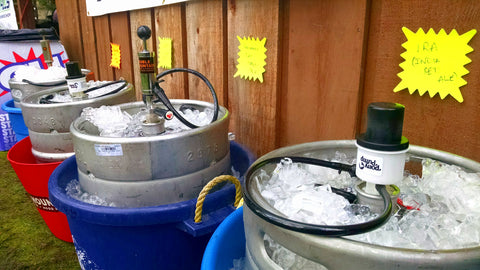
Can I please just get a beer sponsor?!
Trail and Ultra sponsorship has developed several defined tiers of athlete support. Let's say you're a big time shoe and/or apparel company. There's the Ambassadors, who receive shoes, possibly a racing/training kit, and maybe a small racing fee stipend (but not likely). Then there's the racing "B" team. For a large corporate sponsor, this would probably be a national group of athletes and include everything an ambassador gets with a few more swag items and racing fees plus travel stipend, and possibly podium incentives. Finally there's the racing "A" team... The "coolest kids". This could be an international group of athletes. All of the above is usually a given, with varying degrees of what I'll call "living" stipend.
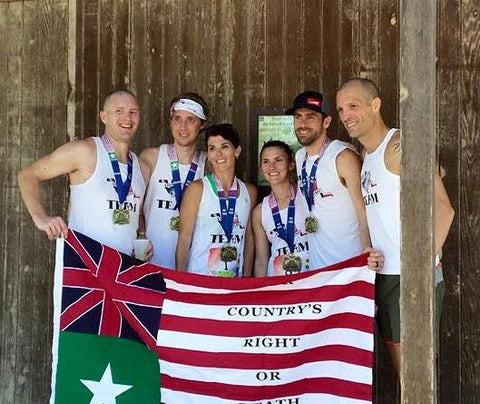
Team Victory/Trail Racing Over Texas
It can be a huge personal boost and honor to fill out the ranks of any of these teams. On the flip side, there can also lurk an unhealthy draw if you're chasing it like a carrot at the end of a stick. Again, I've had my moments of being that person. teetering on the edge of not playing true to my inner beliefs and spirit. Fortunately, friends would remind me that I'm supposed to be having fun, a highly valuable gauge of true success... yeah, that's right!... fun.
Recently I was shocked to witness a stellar athlete emotionally rip themself apart, not because of a simple mishap during a race that caused them to drop from the event, but because, in their mind, they were afraid of what their sponsor would think of them! With all due respect to the athlete, they were running for an awesome "B" team, yet chasing a possible "A" team position. Rather than not starting for lack of readiness, or dropping from poor performance, (I won't "out" the individual with details) this was a drop due to human error. One minute they were doing great, the next- their race was all over. That's upsetting for anyone. What struck me the deepest, beyond being upset for themself, was the fact that they were so upset about how their sponsor would see the worth of their abilities.
Now having said all this, I'm sure one can make the correlation between the two parties as that of an employer and employee, which is sort of fair to say. Maybe by seeing it that way, some potentially self-imposed pressure is placed on the athlete by themself more than necessary? And/or maybe the sponsor is actually a jerk? Let's be real. Yes, I've heard stories, and experienced a handful of not so positive interactions from sponsor to athlete (not so much the other way around) that would make someone feel more like being in a stifling work environment. I've also seen tons of awesome things that many of these same sponsors have done for their athletes that make it an exciting experience (sorry for pulling punches and not naming names). So, trying to point the finger at a specific cause is obviously silly. However as these relationships continue to transpire, I can only hope that they do so with transparent and honest communication between each other, just like any good relationship.
When I was a kid, all I ever wanted to do was play. Play, for me, was actively and dramatically jumping, rolling, running, creating wild imaginary worlds in my head. Worlds in peril and in need of a hero. Wherever it was, there was nothing that could stop me from saving the day, except for the distant voice of my mom or dad calling me to stop.
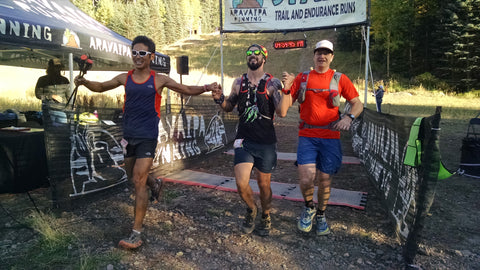
Strangers at the start, family at the finish.
Of course I grew up, well... mostly grew up. Instead of toning down my personality and getting "serious," I ended up taking the joyful, dramatic exuberance of all those years of play, and continued channeling it into the things that excited me in life. Looking back on it all, I'd say I was a fortunate kid. Not because of how I decided to live my life, but because of the two people who both allowed and fostered me to live it that way. Pressure, but no pressure, simplistically speaking... I was the athlete and they were the sponsors. It's a family affair, very much like a previous post on these pages regarding runners and pacers.
My folks gave me the space to be me: a classic dreamer; yet also provided a balanced structure to be a realist with responsibility. As much as I hated the later part, it struck me early on that the two perspectives needed each other like Cheech and Chong... um, sorry, no- like Darth and Obi-Wan... Alright, you know what I mean.
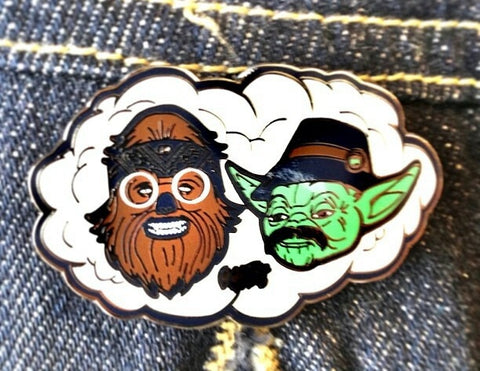
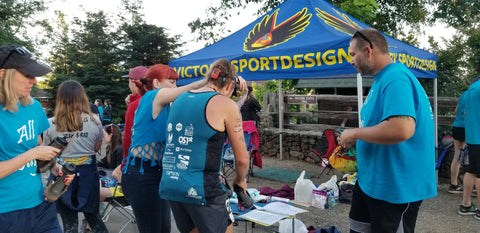
Superstar Victory Athlete: Ken "All Day" Michal.
So now I've become the corporate "thing" (or as the team calls me: "Big Papa"... at least that's what our contract stipulates that they call me ;-)). Oh, how the tables turn- and ultimately, I'm given the opportunity to foster the play of others. I know, I know... there is that underlying fact regarding widgets to sell, and branding that makes us all walking billboards. Yet, at the heart of my path, it's come to this because I'm a fan, and I want to see our athletes blossom in tandem with the sport. Beyond any influence I could possibly have, I would hope that the sponsor (parent)/athlete (child) connection always flows together as a positive conductive circle. When that happens, everyone wins. Sponsor support contributes to the well-being of the sport. Our heroes continue to run long and well, unencumbered to fly on their terms, lighting inspiration in our playful souls. With care, respect, and love for for what we all do, the overall strength of the field (our community) is nourished; and what's planted in the garden always grows best that way.
Please feel free to let me know what you think about all this. If you're a past or current sponsored athlete and want to add your perspective, go for it! If you're a sponsor and want to contribute your take on this, go for it! If you think this discussion could go further, or think my view is bogus, let me hear your voice.


Leave a comment